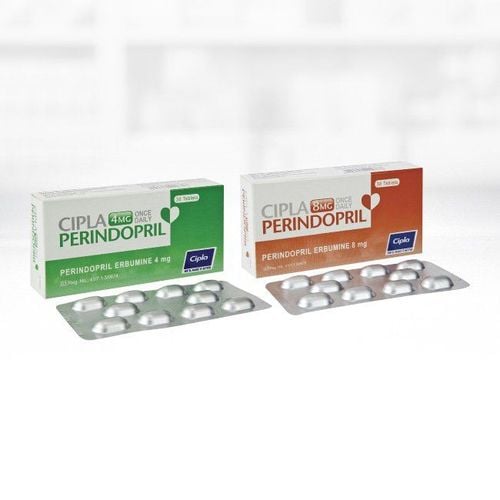This is an automatically translated article.
Alvoprel is a cardiovascular drug, the main ingredient is Irbesartan 300mg. It is used in the treatment of primary hypertension, hypertensive type 2 diabetic kidney disease.
1. What are the effects of Alvoprel?
Alvoprel belongs to the group of cardiovascular drugs, made in the form of film-coated tablets, the main ingredient is Irbesartan 300mg. Alvoprel is used to treat primary hypertension, hypertensive type 2 diabetic kidney disease.
Alvoprel is contraindicated in patients with hypersensitivity to irbesartan or other components of the drug, drugs containing aliskiren in patients with renal failure and diabetes (GFR < 60 mL/min/1.73 m2).
Alvoprel is not recommended for pregnant women in the first 3 months of pregnancy because there are not many studies on this subject. Contraindicated in pregnant women in the second and third trimesters of pregnancy because the drug is toxic to the fetus (decreased kidney function, low amniotic fluid, delayed ossification of the skull) and toxic to the neonate (renal failure, hypoglycemia) pressure, hyperkalemia).
2. Dosage - How to use
Alvoprel can be taken orally, with or without meals. The recommended dosage of the drug is as follows:
Adults: The recommended starting and maintenance dose is 150mg/time/day. Alvoprel at a dose of 150 mg once a day usually controls blood pressure better than a dose of 75 mg. However, in some special cases such as patients on hemodialysis, hypovolaemia, hemodialysis patients and patients over 75 years old, the 75mg dose is preferred. In those who cannot adequately control blood pressure at a dose of 150 mg, it can be increased to 300 mg or combined with diuretics such as hydrochlorothiazide for synergistic effects with irbesartan. In hypertensive type 2 diabetic individuals, the starting dose should be 150 mg once daily and may be titrated to 300 mg once daily equivalent to the maintenance dose for renal disease. Alvoprel 900mg dose for adults continuously for 8 weeks does not cause any toxicity to the body. Alvoprel overdose may cause symptoms such as hypotension and increased/decreased heart rate. Current measures to manage overdose are still limited to close monitoring, symptomatic treatment and supportive care (emetics, gastric lavage, activated charcoal). Alvoprel cannot be removed through hemodialysis alone.
3. Caution
Some notes before starting to use Alvoprel include:
For patients with renal impairment who do not require dose adjustment, consider a starting dose of about 75mg with hemodialysis and volume depletion. When taking the drug requires periodic monitoring of serum potassium and creatinine, there is no experience with the use of irbesartan in patients with recent kidney transplantation. For patients with mild to moderate hepatic impairment, no dose adjustment is required. There are no clinical studies on efficacy and side effects in patients with severe hepatic impairment. For people over 75 years old should consider starting with 75mg dose Not recommended for use in people under 18 years Intravascular volume depletion: People with hypovolemia such as salt and water loss due to strong diuretics, With a salt-restricted diet, diarrhea or vomiting, symptomatic hypotension may occur, especially after the first dose of the drug. Therefore, blood volume should be treated prior to administration of irbesartan. Renal artery stenosis: Increased risk of severe hypotension and impaired renal function after taking Alvoprel Type 2 diabetes and renal disease: In a study of subjects with advanced renal disease, the effects of Alvoprel on Renal and cardiovascular outcomes were not consistent across all subgroups, being less common in women and non-Caucasians. Vascular tone and renal function depend mainly on RAAS activity (severe congestive heart failure, renal artery stenosis, etc.): Treatment with Alvoprel may cause acute hypotension, hypernitremia, oliguria, and oliguria. urinary or acute renal failure (rare). Excessive hypotension in patients with ischemic heart disease or ischemic cardiovascular disease may lead to myocardial infarction or stroke. Polysorbate 80 can cause allergies and castor oil can cause nausea, vomiting, abdominal pain, diarrhea.
4. Drug interactions
Possible drug interactions when taking Alvoprel with other drugs include:
Diuretics and other antihypertensives: Combination with Alvoprel may increase the effect of drugs, except for beta-blockers, blockers. long-acting calcium, thiazide diuretics. Pretreatment of hypertension with high-dose diuretics may result in hypovolemia and a risk of hypotension when initiating alvoprel therapy. Potassium-containing preparations or potassium-sparing diuretics: Combined with Alvoprel may cause hyperkalemia, so the combination is not recommended. Lithium: Combination with Alvoprel may cause increased blood levels and toxicity of lithium. Although very rare, the combination should still be avoided. If co-administration is required, blood lithium levels should be closely monitored. Drugs containing aliskiren and ACE inhibitors: Use of dual-acting RAAS inhibitors may increase the risk of adverse events such as hypotension, hyperkalemia, and decreased renal function (including acute renal failure). ) than when using only one agent acting on the RAAS system. If use is mandatory, regular monitoring of renal function, electrolytes and blood pressure is recommended. Do not combine ACE inhibitors and angiotensin II antagonists in patients with diabetic nephropathy. Non-Steroidal Anti-Inflammatory Drugs: Combination with Alvoprel may decrease the effect of Alvoprel, increase the risk of renal function impairment, which may lead to acute renal failure and hyperkalemia, especially in patients already have pre-existing renal dysfunction. The combination should be used with caution, especially in the elderly, with adequate fluid intake and monitoring of renal function after initiation of the combination and periodically thereafter.
5. Side effects
Side effects of Alvoprel include:
Very common: Hyperkalemia in hypertensive patients with diabetes. Common: Dizziness, orthostatic vertigo, orthostatic hypotension, nausea, vomiting, myalgia-skeletal pain, fatigue, elevation of serum creatine kinase (unrelated to musculoskeletal events detected on clinical); decrease in hemoglobin (not clinically significant). Uncommon: Tachycardia, flushing, cough, diarrhea, indigestion/heartburn, jaundice, sexual dysfunction, chest pain. Frequency not known: Thrombocytopenia, hypersensitivity reactions such as angioedema, rash, urticaria, hyperkalemia, dizziness, headache, tinnitus, taste disturbances, hepatitis, abnormal liver function, leukopenia vasculitis, arthralgia, myalgia (in some cases with increased serum creatine kinase), impaired renal function, including renal failure in patients at risk. Side effects that do occur usually go away after a period of time when the medication is stopped. If you experience any strange symptoms while taking Alvoprel, please inform your doctor for timely resolution. Mild side effects usually do not require any special treatment, if medication is necessary, attention should be paid to treating hypovolaemia if present.
Please dial HOTLINE for more information or register for an appointment HERE. Download MyVinmec app to make appointments faster and to manage your bookings easily.













